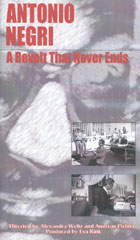
Antonio Negri: A Revolt that Never Ends 2004
Distributed by First Run/Icarus Films, 32 Court St., 21st Floor, Brooklyn, NY 11201; 800-876-1710
Produced by Eva Rink
Directed by Alexandra Weltz and Andreas Pichler
VHS, color and b&, 52 min.
College - Adult
Biography, European Studies, Labor Relations, Political Science
Date Entered: 06/07/2007
Reviewed by Christopher Dunham, Fairfield University, Fairfield, CTWell-crafted, albeit with a few minor problems, this one-sided documentary combines contemporary interviews with archival footage to tell the controversial story of Antonio Negri.
Negri, a 1960s and ’70s Italian university professor and radical activist founded Potere Operaio (“Workers Power”) and was a leader of Autonomia Operaia (“Workers Autonomy”). He espoused revolt, violent if necessary, to gain more social equity for the working class, based on the premise that capitalism exploited workers and was unjust. He promoted theft of goods and non-payment of services as means of equalization, leveling the social strata for a freer society. Charged with numerous crimes against the state, as well as kidnapping and 17 murders, Negri was tried and convicted of inciting violence with his writings and leadership and sentenced to prison (the kidnapping and murder charges were dropped for lack of evidence). Elected to Parliament while in prison, he was released to serve, but legal maneuverings made his return to prison imminent and he fled to France for 14 years. His sentence reduced on appeal, he returned to Italy in 1997 to finish his prison time and promote justice for fellow activists; he was released in 2003. His present anti-globalization stance is the basis of the best-selling book Empire (2000, Harvard University Press, co-authored with Michael Hardt) and the recent World Trade Organization protests in Seattle and Barcelona can be traced to his theories.
The audio and video qualities are very good, marred only by occasional too-tight close-ups, two irrelevant scenes, and a couple of minor stumbles in narration. The subtitling was excellent (appropriately timed with speech and shown for very readable duration), though missing for two archival scenes. While the film mostly is chronological and the narration gives fairly complete information, date and location text would have improved the archival scenes. The interview clips include former colleagues, fellow activists, co-author Hardt, and Negri himself.
Recommended for higher education for courses in contemporary Italian history, national and global economics, socialism and Marxism, European studies, and labor relations.